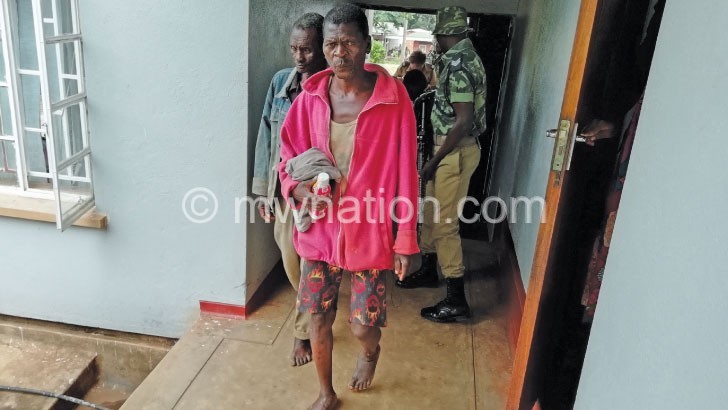When a life costs K800 000
Sitting on the veranda of a grass-thatched hut, in a remote village in Dedza District near the border with Mozambique, Mercy Maulidi struggles to recount how her 14-year-old son with albinism, was abducted by masked men in the early hours of February 12 2019.
“I was fast asleep when my son, Goodson, yelled from his room to wake me up,” she says. “When I woke up, I realised that my son was in the hands of masked men.”

Sensing danger, Mercy grabbed her little daughter, also born with albinism, and dashed out of the hut while calling for help from relatives and neighbours.
“There were five masked men. They had a torch on when I fled. They tried to gag Goodson to prevent him from crying for help.”
Luckily, the boy managed to flee from the attackers. He, too, rushed out of the hut. However, the attackers were fast enough. They caught up with him outside, prompting Mercy and her daughter , Faith, to hide in a maize field.
Immediately, Mercy’s uncle, whose house stands a few metres away, arrived on the scene accompanied by some neighbours. A fight ensued against the roughnecks under the fading moonlight.
Meanwhile, Goodson went back into the hut. He pulled down a mosquito net and wrapped himself with it, hoping the attackers would not trace him if they followed him.
“The attackers hit my uncle in the head and he collapsed,” the grieved mother recalls, adding that the thugs also overpowered the neighbours. They seriously wounded some of them with machetes.
Goodson’s grandmother also got out of her hut to witness the ordeal. She, too, sustained a deep cut on the arm in the heat of the pandemonium.
Having overpowered the people outside, the attackers went back into Mercy’s hut. They got the defenseless Goodson and promptly bundled him outside. They vanished under the watch of the defeated villagers, satisfied their mission had been accomplished.
To some people, this is one of the albino abduction cases to discuss, just for now, to demonstrate the moral decadence Malawi is experiencing. But for Mercy and her relatives, the experience of that night will haunt them for years.
“I am shocked. I don’t know what to do. I had high hopes for my son. Yet he is gone,” Mercy lamented, tears flowing from her eyes.
Mercy gave birth to the two children with albinism from her first marriage. After many years of single parenting, she fell in love with another man. They cohabited just for a month.
“A few days ago, I told him the affair was over because his character was suspicious,” she says.
The man, Kumbilani Patson of Chiwala Village, Traditional Authority (T/A) Chiseka in Lilongwe, has pleaded guilty to the boy’s abduction.
He told a jam-packed Lilongwe Magistrate’s Court that he was tricked into abducting the boy after being offered K800 000.
Patson confessed having delivered the boy to the man who offered to buy him.
Goodson is still missing. If indeed the boy was murdered for his parts, this will bring to 26 the number of albino killings in the country since 2014.
In 2017, Amnesty International faulted the government of Malawi for failing to protect people with albinism in their localities. Association of Persons with Albinism in Malawi (Apam) and some human rights organisations also point a finger at the government for offering lip service.
“We, the people with albinism, are convinced that Malawi is not safe for us. That is why Apam is appealing to the UN to discuss with other countries to provide asylum for us,” Rose Msope, a girl with albinism, says.
When member of Parliament in Mulanje Bon Kalindo staged a half-naked protest march in Lilongwe two years ago, he urged the government to start sending to the gallows people convicted of murdering albinos, arguing that the death penalty is provided for in the country’s statutes.
Dr. Hetherwick Ntaba, who is chairperson of a committee President Peter Mutharika set up to address issues affecting people with albinism, appears to agree with Kalindo.
“The death penalty is in our criminal code, but it has not been implemented. The President has not signed the implementation of the death sentence. Now if you look at what has happened in Tanzania, if the stories we are hearing are true that they have implemented the death penalty in Tanzania on the murderers of albinism victims and the evil practice has gone way down, perhaps the same could work here. It could be an answer in that sense,” Ntaba says.
Protest marches have been held. Different organisations have spoken against the barbaric attacks against people with albinism. And the police continue to effect arrests. But if nothing more punitive happens now people like Mercy Maulidi, who are looking after relatives with albinism, will continue to live in fear.
“I am worried about the security of my daughter, Faith. I don’t know how I am going to protect her. I am really worried,” she laments.





